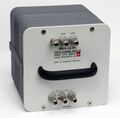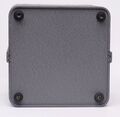1482-B: Difference between revisions
No edit summary |
No edit summary |
||
| Line 18: | Line 18: | ||
The Type 1482-B is 100 μH inductance standard designed to replace the Type [[106]] Standard Inductor. The inductor is symmetrically wound toroid on a ceramic core. The toroid is hermetically sealed in a mixture of cork and silica gel then potted in an aluminum case. The connections to the inductor are three Type [[938-A]] jack-top binding posts. Two of the terminals for the inductor and the third is the case connection with shorting link, affording two or three terminal standards. Each inductor is supplied with a calibration certificate with corrections for 200 Hz, 500 Hz, and 1 kHz and actual specifications. | The Type 1482-B is 100 μH inductance standard designed to replace the Type [[106]] Standard Inductor. The inductor is symmetrically wound toroid on a ceramic core. The toroid is hermetically sealed in a mixture of cork and silica gel then potted in an aluminum case. The connections to the inductor are three Type [[938-A]] jack-top binding posts. Two of the terminals for the inductor and the third is the case connection with shorting link, affording two or three terminal standards. Each inductor is supplied with a calibration certificate with corrections for 200 Hz, 500 Hz, and 1 kHz and actual specifications. | ||
For all the members of the | For all the members of the series see [[1482]] article. | ||
==Specifications== | ==Specifications== | ||
Latest revision as of 19:05, 1 August 2024
The General Radio 1482-B Standard Inductor was introduced in Catalog N (1954) and remained available through Catalog 1978.
The Type 1482-B is 100 μH inductance standard designed to replace the Type 106 Standard Inductor. The inductor is symmetrically wound toroid on a ceramic core. The toroid is hermetically sealed in a mixture of cork and silica gel then potted in an aluminum case. The connections to the inductor are three Type 938-A jack-top binding posts. Two of the terminals for the inductor and the third is the case connection with shorting link, affording two or three terminal standards. Each inductor is supplied with a calibration certificate with corrections for 200 Hz, 500 Hz, and 1 kHz and actual specifications.
For all the members of the series see 1482 article.
Specifications
- Nominal Inductance: 100 μH
- Accuracy: ±0.25%
- Resonant Frequency: 2.25 MHz
- DC Resistance: 0.083 Ω
- Q at 100 Hz: 0.76
- Milliamperes rms: 1550 mA, 1.5° C rise, 200 mW; 6010 mA, 20° C rise, 3 W
- Stability: inductance change is less than ±0.01% per year




